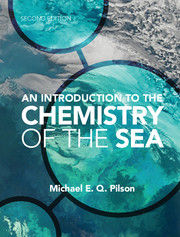Book contents
- Frontmatter
- Contents
- Preface
- Acknowledgments
- 1 Introduction
- 2 The water in seawater
- 3 Salinity, chlorinity, conductivity, and density
- 4 Major constituents of seawater
- 5 Simple gases
- 6 Salts in solution
- 7 Carbon dioxide
- 8 Nutrients
- 9 Trace metals and other minor elements
- 10 Radioactive clocks
- 11 Organic matter in the sea
- 12 Anoxic marine environments
- 13 Exchanges at the boundaries
- 14 Chemical extraction of useful substances from the sea
- 15 Geochemical history of the oceans
- Appendix A The chemical elements
- Appendix B Symbols, units, and nomenclature
- Appendix C Physical properties of seawater
- Appendix D Gases
- Appendix E Carbon dioxide
- Appendix F Dissociation constants and pH scales
- Appendix G Solubility of calcium carbonate
- Appendix H Effects of pressure
- Appendix I Radioactive decay
- Appendix J Geochemical reservoirs, and some rates
- Appendix K Sound absorption
- Epilogue
- Questions for chapters
- Glossary
- References
- Index
- Miscellaneous end matter
- References
9 - Trace metals and other minor elements
Published online by Cambridge University Press: 05 February 2013
- Frontmatter
- Contents
- Preface
- Acknowledgments
- 1 Introduction
- 2 The water in seawater
- 3 Salinity, chlorinity, conductivity, and density
- 4 Major constituents of seawater
- 5 Simple gases
- 6 Salts in solution
- 7 Carbon dioxide
- 8 Nutrients
- 9 Trace metals and other minor elements
- 10 Radioactive clocks
- 11 Organic matter in the sea
- 12 Anoxic marine environments
- 13 Exchanges at the boundaries
- 14 Chemical extraction of useful substances from the sea
- 15 Geochemical history of the oceans
- Appendix A The chemical elements
- Appendix B Symbols, units, and nomenclature
- Appendix C Physical properties of seawater
- Appendix D Gases
- Appendix E Carbon dioxide
- Appendix F Dissociation constants and pH scales
- Appendix G Solubility of calcium carbonate
- Appendix H Effects of pressure
- Appendix I Radioactive decay
- Appendix J Geochemical reservoirs, and some rates
- Appendix K Sound absorption
- Epilogue
- Questions for chapters
- Glossary
- References
- Index
- Miscellaneous end matter
- References
Summary
Knowledge of the chemical speciation of trace elements in seawater is, from a practical standpoint, at an undeveloped stage.
Burton 1975In the earlier discussion of the major elements in seawater, the arbitrary division between major and minor elements was set at a mass concentration of one milligram per kilogram, equal to one part per million. This is a convenient separation, because only salts present in concentrations somewhat greater than 1 mg kg-1 can have a detectable effect on the density and related physical properties of seawater. Most of the elements present in smaller concentrations are not conservative in seawater; by examining the distributions of these elements we may learn much about the biological and geochemical processes in the ocean. Furthermore, the analytical difficulties of measuring or even detecting many of the substances present in small concentrations in seawater often pose special problems that must be addressed during any consideration of these elements.
Analytical considerations
In approaching the analysis of any substance present in seawater at a concentration of, for example, around 1 µg kg−1, a value common for some important elements, it should first be realized that the substance is present in a matrix consisting of 35 000 000 µg of a complex mixture of salts and other substances. This fact alone can impose severe difficulties. Furthermore, when dealing with concentrations at this level or below, it is often not appreciated that equivalent or even much greater quantities of the substance to be analyzed may be introduced during collection at sea, as contaminants in the reagent-grade chemicals required for the analysis, in dust from the air, and on the walls or in the very composition of ordinary laboratory glassware and other equipment.
- Type
- Chapter
- Information
- An Introduction to the Chemistry of the Sea , pp. 228 - 260Publisher: Cambridge University PressPrint publication year: 2012



